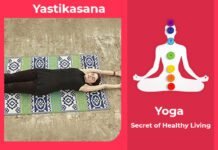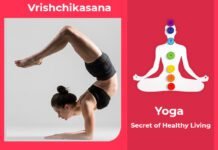What is Halasana
Halasana Halasana is repose, to assure maximum benefit.
- It consists in lying an instant on the back, then lifting the legs (firm) slowly over the trunk, helping to incline them with the pressure of the hands against the floor, to both sides of the head, the body forming a perfect arch
Also Know as: Full Plow Posture, Full Plow Pose, Purn Hal Asan, Purna Hala Asana
How to start this Asana
- From the shoulder stand pose, bring your feet at an angle above your head.
- Bring your hands behind your back to support and control the descent.
- If possible bring gently the toes to the floor keeping your knees straight.
- Once the feet touch the floor bring your arms flat on the floor with palms down touching the floor.
- For more advanced students, interlock the fingers keeping your hands in contact with the floor.
- Try breathing as comfortably and rhythmically as possible.
- If you do not have the necessary flexibility to do the full posture, it is okay to keep your feet up in the air and to let your knees be bent as required by your back muscles.
- Hold the asana from a few seconds to one minute.
How to end this Asana
- To come out of the posture, lift your feet up to a 45 degree angle, bring your palms flat on the floor and slowly bring your back, hips, legs and feet onto the floor paying attention to keep the head and shoulders on the floor.
- Relax on your back.
Video Tutorial
Benefits of Halasana
According to research, this Asana is helpful as per below(YR/1)
- Brings fresh blood to the throat and thyroid gland.
- Locking of the chin massages the thyroid gland.
- Extends the cervical section of the spine giving it a powerful stretch.
- Also stretches rest of the spine as well as muscles of the back side of thigh and leg.
- During the inhalation intense pressure is applied to the abdomen giving a good stimulation to the digestive system.
- Opens up the shoulder joints.
Precaution to be taken before doing Halasana
As per several scientific studies, precautions need to be taken in diseases mentioned as per below(YR/2)
- You should not do halasana if you have any neck problems.
- If you suffer from “rounded shoulders” a.k.a. kyphosis, do not stretch too far and do not hold the posture too long.
- Consult your doctor or chiropractor before practicing.
So, consult your doctor if you have any of the problem mentioned above.
Histroy and scientific base of Yoga
Due to the oral transmission of sacred writings and the secrecy of its teachings, yoga’s past is riddled with mystery and confusion. Early yoga literature were recorded on delicate palm leaves. So it was easily damaged, destroyed, or lost. Yoga’s origins may be dated back over 5,000 years. However other academics believe it could be as old as 10,000 years. Yoga’s lengthy and illustrious history may be split into four distinct periods of growth, practise, and invention.
- Pre Classical Yoga
- Classical Yoga
- Post Classical Yoga
- Modern Yoga
Yoga is a psychological science with philosophical overtones. Patanjali begins his Yoga method by instructing that the mind must be regulated – Yogahs-chitta-vritti-nirodhah. Patanjali does not delve into the intellectual underpinnings of the need to regulate one’s mind, which are found in Samkhya and Vedanta. Yoga, he continues, is the regulation of the mind, the constraint of the thought-stuff. Yoga is a science based on personal experience. The most essential advantage of yoga is that it helps us to maintain a healthy bodily and mental state.
Yoga can help to slow down the ageing process. Since aging starts mostly by autointoxication or self-poisoning. So, we can considerably limit the catabolic process of cell degeneration by keeping the body clean, flexible, and properly lubricated. Yogasanas, pranayama, and meditation must all be combined to reap the full advantages of yoga.
SUMMARY
Halasana is helpful in increase flexibility of muscles, improves shape of the body, reduce mental stress, as well improves overall health.




